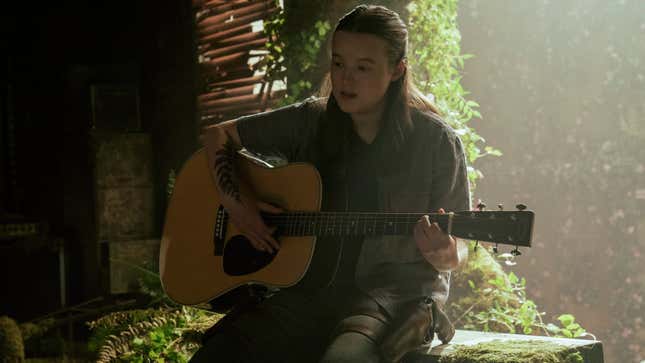
Well, y’all, this week I decided to give The Last of Us showrunner Craig Mazin a break. I’ve been pretty harsh toward the show’s second season for fundamentally misunderstanding so many of the bold creative decisions of the game on which it’s based. This week’s episode, however, was the best—or at least the least frustrating—one yet. We’re firmly in Seattle for Ellie’s revenge tour, and while she doesn’t quite get to any of her targets this week, we do get plenty of time to see her and Dina be cute and gay together, as well as an explosive intro to one of the best characters in the show, and some new details about the war between the Seraphites and the W.L.F.
I’ll still have critiques to get into, but overall I enjoyed Ellie’s first day in the Emerald City. Don’t get too comfortable, Mazin. I’ll see you in the ring again next week, probably.
Sic Parvis Magna
Oh, hi, Josh Peck. This episode opens with a flashback to 2018, roughly 15 years after the outbreak begins in the show’s timeline. A FEDRA squad is riding through the Seattle quarantine zone, sharing jolly stories about their time enforcing the will of the fascist military organization. Peck’s unnamed soldier is the focus of the scene until someone asks why FEDRA calls citizens “voters,” then the real star of the scene makes himself known: Isaac (Jeffrey Wright).
In the corner of the car, Isaac has been mostly quiet through all the hooting and hollering. But then he gives them a history lesson. He explains that the “voter” pejorative comes from FEDRA’s fascist rise, in which the military took away citizens’ right to vote, and started using the term to mock people’s newfound powerlessness under their regime. Peck’s character, clearly unsettled by Isaac’s interruption, says he “didn’t mean anything by it.” To which the sergeant replies that of course he didn’t, because he’s “thoughtless.”
As the truck moves along the Seattle streets, it comes across a blockade. The FEDRA squad prepares their guns, but Isaac insists that he’ll go out and talk to the approaching civilians alone. As he exits the truck, he tells the FEDRA soldier who inquired about the “voters” to come along with him, saying he might “learn something” from the interaction. And what transpires is certainly instructive, though Isaac’s conversation with the civilians’ leader ends up being pretty short. After verify each other’s identities, Isaac lets out a sigh and casually tosses two grenades into the back of the FEDRA truck. He guns down the driver and then nonchalantly shakes the civilian leader’s hand as she says, “Welcome to the fight.” He looks at the FEDRA rookie and tells him to make his choice.
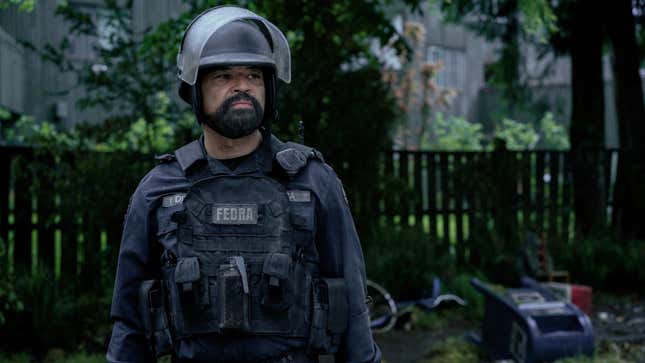
Isaac is far and away one of the best parts of The Last of Us’ second season, and not just because they got Wright to reprise the role from Part II. In the game, he got remarkably little screen time for as much impact as he has on the events of Seattle, and the show makes great use of him with new scenes illuminating his role as the Washington Liberation Front’s top dog. From this scene alone, I was immediately drawn in by Wright’s unsettling but charismatic performance and genuinely could not wait to see how the show would make the most of our extra time with him.
“I’ll be comin’ for your love, okay”
Back in the present day, Ellie (Bella Ramsey) and Dina (Isabela Merced) are scavenging the remains of Seattle for supplies. The pharmacy they’re looking through doesn’t have much, but it does have one thing that catches Dina’s eye. She grabs a box off one of the shelves and shouts to Ellie that she’s gonna take a quick pee break. Considering her sudden stomach issues last episode, you can probably see where this is going.
When Dina reunites with Ellie and their horse Shimmer, Ellie senses something is off and asks if she’s alright. Without missing a beat, Dina says everything’s good and reminds her they need to get moving. They’ve got “people to kill.”
As the two ride around, they note that Seattle is surprisingly well-preserved for a city that was bombed at some point during the outbreak. They also note there are a lot of “rainbows” around this part of the city. Ellie theorizes the Pride flags—for which she has no context—were a sign of optimism within the city before the infection tore it asunder. This moment has an equivalent in Part II in which Ellie and Dina enter a queer bookstore and note the rainbow flags and gay literature, but don’t know what any of it is. I still find this to be one of the most compelling examples of The Last of Us acknowledging that culture is just as much a casualty of the apocalypse as people are, as these two queer girls are standing in a place which, at one time, would have likely held some significance to them, but no one ever taught them what a Pride flag was in a quarantine zone.
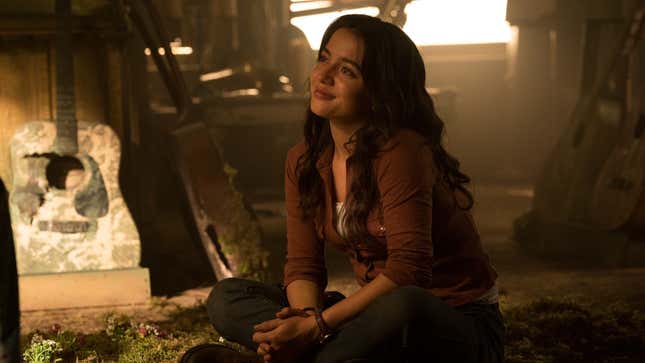
Any notion that the rainbows were indications that Seattle was a happy place immediately goes away when the pair turns a corner and finds the aftermath of a FEDRA battle. The bodies that are decaying on the street have been here for a long time, and the aftermath tells Ellie that FEDRA might have been dealing with infighting in the city. As she looks inside a molded-over tank, she finds burnt bodies and says it’s like the Apollo 1 disaster, as she gets to flex her astronaut knowledge. “At least they died for something worthwhile,” Dina says. Ellie agrees and says these FEDRA corpses are just “assholes killed by other assholes.”
Dina then notes W.L.F. graffiti on a TV station a ways out, which Ellie nearly starts booking it toward before Dina points out that barreling on horseback to an uphill station in the middle of the day is an easy way to get themselves killed. The show does a good job of illustrating the contrasts between Ellie’s blind rage and Dina’s more considered approach. Ellie would probably have gotten herself killed on the way here if not for Dina’s thinking. Now, if only she could apply all that consideration to her love life.
The two take Shimmer and hide out in an abandoned record store. Ellie looks through some of the old selections, from Bob Marley to Tears for Fears. Most of the instruments in the store have been destroyed by the elements, but Ellie finds an acoustic guitar remarkably preserved in its case. It just needs a little tuning. Then she starts singing an acoustic rendition of A-ha’s “Take On Me,” now iconic from its use in the game. Dina hears it from downstairs and heads up, then urges Ellie to keep playing. Just like Ashley Johnson’s rendition in Part II, Ramsey’s performance is understated, and Ellie doesn’t come off as a vocal powerhouse or anything. But it’s incredibly earnest, and you can see Dina falling in love with her as she performs it. She says her skills with the gee-tar are from all the lessons Joel gave her over the past few years.
Fake wars about real ones
Well, now that we’ve had a healthy helping of cute gay shit, it’s time to go back to The Horrors. We see a slightly older Isaac cooking in a kitchen and telling someone off-screen that when he would try to impress women in his younger years, he’d cook for them. He wanted better tools, though, and dreamed of owning fancy Mauviel cookware to make the most of his culinary talents. He finally achieved that dream of having Mauviel at his fingertips here in Seattle, though what he’s using them for in this scene is quite different from what he probably imagined all those years ago. We finally pan over to see who it is Isaac’s been regaling with romance advice, and it’s a chained-up, naked, bloody Seraphite. Or “Scar,” as the W.L.F. call them. In the back and forth, we learn that the Seraphites follow a prophet, but there seems to be some disagreements within the cult about whether she was just a person or a Christ-like figure capable of miraculous feats. Isaac’s not interested in debating this, however. All he wants to know is where the Seraphites will attack next. When the man refuses to answer, Isaac tells him to put out his hand before he presses the hot Mauviel frying pan against his skin.
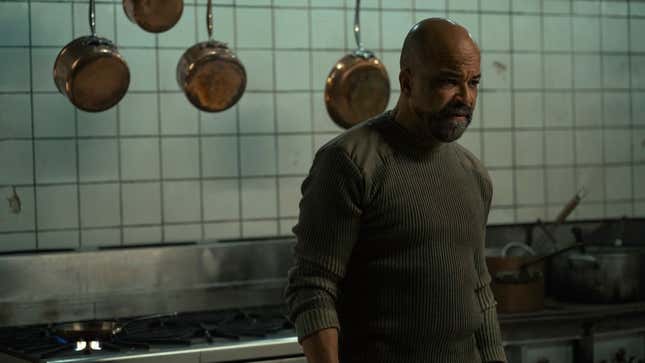
Annoyingly enough, the Last of Us show does what it does best and ensures that we know this is bad. Outside of Isaac’s torture chamber, we see one W.L.F. lackey say to another, “This is so fucked!” only to be told to shut up because Isaac knows what he’s doing. You know, in case you didn’t realize that torturing people with scalding hot cookware is not very cash money. Isaac is a bad guy, just so we’re clear. Are we all on the same page now? Do we all understand that, as compelling as Wright is on screen, he’s playing a bad dude? Great. Mission fucking accomplished, Last of Us show.
These asides, in which The Last of Us clarifies what you’re supposed to feel, are somehow more frustrating when the episode was doing a great job of just letting characters talk to each other like they don’t know a camera is in the room. Isaac’s introduction is a no-nonsense character moment that tells you everything you need to know about him through his actions, and his gleeful, torturous monologue puts Abby’s ridiculously overwrought one from episode two to shame. But then we get to see this nameless dude be like, “Hey, are we the baddies?” instead of letting the audience figure that out themselves. Just cut that shit out. (They won’t. It’s going to get so much worse.)
After Isaac removes the pan from his prisoner’s skin, the Seraphite prays to the prophet, asking her to “fill [his] soul.” Isaac asks if the prophet was “filling his soul” when he shot a W.L.F. child. The two then go back and forth about where all this violence between the two factions began, and it becomes clear that this has been going on for so long that these two can’t even pinpoint who started the fight in the first place. The Seraphite says that the W.L.F. will lose this war either way. Isaac isn’t convinced, given the cult is using archaic weaponry against their heavily militarized militia. But the cultist doesn’t believe that this war will be won by force; he believes that eventually the wolves will see their prophet’s light. When it becomes clear that his conviction can withstand another round with the scalding hot frying pan, Isaac pulls out a handgun and kills the cultist. We then get another cutaway to the W.L.F. lackeys, in which one dude is uncomfortable with what’s transpired while the other is hardened to the violence because Scars are “animals.”
In a vacuum, the Seraphite and W.L.F. conflict is meant to serve as a large-scale reflection of the cycle of violence Ellie and Abby are caught in. Isaac and the Seraphite can’t even pin down when this whole war started, and they’re both so devoted to their cause that it doesn’t matter anymore. This is the tit-for-tat these two women are inflicting on one another, on a scale that goes far beyond dead dads and sad daughters. But beyond its use as a thematic mirror reflecting the inevitable self-destruction that comes from the cycle of violence the protagonists are engaged in, the Seraphite/W.L.F. war is also inspired by the ongoing real-world conflict between Palestine and Israel. And there’s no escaping the fact that Part II’s vision of its two warring factions is mostly centrist in a way that points fingers at both sides, suggesting both are equally misguided in continuing their pointless war with each other, rather than presenting a situation in which one faction is struggling for survival and the right of freedom and self-determination against an infinitely more powerful oppressor. And as the general public has become more aware of what’s happening in Palestine in the years since Part II released, it’s become impossible to reconcile the game’s, and now the show’s, fictional war, which we’re meant to believe both sides are equally complicit in perpetuating, with the real-world conflict that inspired it.
In the case of Ellie and Abby, the “both sides” framing is a kindness that the narrative extends to its two leads. It meets both women where they are, acknowledges how they got to places of such violent retribution, and frames them both as victims and perpetrators worthy of sympathy in this cycle of violence their fathers started. When it comes to entire factions of people being swept up in a war, sanding down all the people within them into the arms of fanatical forces who can’t even tell you when this war began, the “both sides” framing loses nuance. Given the real-world inspiration, it’s naive and irresponsible at best, and could be condemned as straight-up propaganda at worst. It may not be explicitly pro-Israel, but fence-sitting is still making a choice. What are we meant to take away from a story inspired by a real-world event, but so divorced from the reality that it doesn’t actually say anything about it?
Now, kiss!
Back to Dina and Ellie’s big gay murder party. As the pair makes a game plan for infiltrating the TV station, they make a pact that they’ll kill any wolves, even if they weren’t part of Abby’s crew. But as luck would have it, they won’t have to, because the wolves in the station have already been taken out by Seraphites. Their bodies have been strung up and gutted, and one look at the carnage sends Dina’s stomach churning. Ellie verifies that none of these are members of Abby’s crew, and realizes that the group they saw slaughtered in the woods was responsible for this violent display. Dina finds a working walkie-talkie on one of the corpses that they might be able to use to intercept W.L.F. comms, but unfortunately it was also used to call for backup, which arrives fully armed. Dina and Ellie hide, but overhear the wolves giving a kill-on-sight order for whoever’s left in the station, so it’s time to skedaddle.
Ellie manages to make it to the upper floors, but the windows are locked and there’s seemingly no way out. Just when it seems like she’s been cornered by a pair of wolves, Dina comes in with the save, shooting the window which they promptly jump through, though they’re not out of the woods yet. As they run away from the station, they crawl into the public transit tunnels, but they’ll have more than wolves to deal with in the subway.
As the wolves throw out flares and fan out to find our little lovebirds, we hear the distant screeching of infected. The W.L.F. squad didn’t expect to see any infected in the Seattle subway, much less an entire horde, and though this situation puts Ellie and Dina in danger as well, they try to use it to their advantage. The two take shelter in one of the subway cars, only to find it littered with bodies they have to crawl over. The infected trample over each other in their mindless fervor, giving the girls a chance to escape through the emergency exit hatch. With the horde on their heels, Dina and Ellie push through a rusted revolving gate. Ellie makes it to the other side, but the gate gets stuck as Dina’s trying to push through. If she were here with anyone else, Dina might have met her end right here as an infected darts towards her with teeth at the ready, but Ellie puts her arm through the grate and lets the infected take a big ol’ bite out of her so Dina can fire one good shot into its stomach. As the two try to collect themselves, Dina can’t help but stare at the bloody bite mark next to Ellie’s tattoo. Even though the two are still running away from wolves and infected, Dina is more focused on the fact that she’ll probably have to kill her best friend before the end of the night.
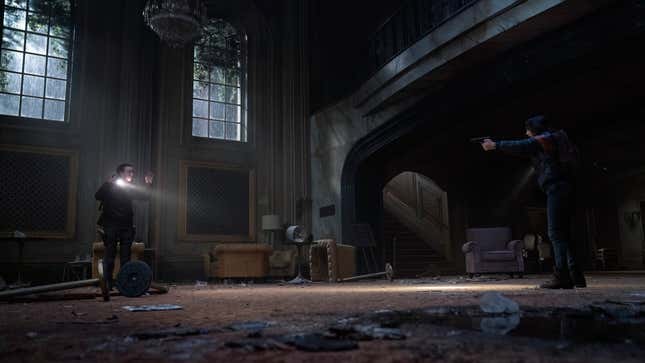
It’s here that Ellie and Dina find what becomes their base of operations in Seattle: an old theater. Ellie is so fixated on finding shelter and barring the door that she doesn’t even notice Dina keeping her distance until she finally pulls out her gun. She’s distraught that Ellie seemingly sacrificed herself for her and asks her not to make this any harder than it has to be. Ellie says that she would die for her friend, but that isn’t what happened here. She finally has to give up the facade and tell Dina that she’s immune to the cordyceps infection. That sounds like nonsense to Dina, but she’s already hesitating, so she’s open to delaying the inevitable as long as possible. Ellie suggests that she sleep on the other side of the room while Dina keeps her gun trained on her, and if she doesn’t turn, she’ll know she’s telling the truth. This reveal was something the show was always going to have to handle differently than the game because of the changes it made to how the infection spreads. HBO’s version of the cordyceps isn’t spread in the air through spores, and Ellie’s immunity was revealed without any room for doubt in the games because she was able to breathe in the fumes without it affecting her respiratory system. Here, the show has to work within the lines it drew for itself so that it wouldn’t have to cover Pedro Pascal’s face with a gas mask half the time, and I was really pleased with how it took this chance to illustrate how Dina cares for Ellie, even when that care takes the form of hesitating to do what she’s been trained to do for her entire life.
Morning comes, and of course Ellie doesn’t turn. She’s completely asymptomatic, but Dina hesitates to put her gun down until Ellie shows her that the bite isn’t showing any signs of infection. Dina slowly walks over to Ellie and, rather than say another word about the post-apocalyptic miracle happening before her eyes, she drops another bomb: “I’m pregnant.”
All of these feelings collide, and Dina, with no intoxication to explain it away, kisses Ellie and then the two have at it on the theater lobby floor. There’s been some understandable concern around the cadence of Dina and Ellie’s relationship in the show, given that Dina has gone back to Jesse (Young Mazino) in the time since Joel’s death, seemingly to make sense of the pregnancy storyline given the show’s elongated stretch of time between the inciting incident and Ellie’s departure from Seattle. It does color Dina and Ellie’s extracurricular activities here differently, as it paints Dina as a far messier bisexual woman figuring her shit out. It works in the show’s favor in some cases, giving us the catharsis of the two finally doing the deed after four episodes of will they/won’t they tension, but I wouldn’t blame anyone who wasn’t thrilled that Dina’s new arc ends up playing into some shitty stereotypes around bisexual people as cheaters, and moves her away from the confident, self-assured queer woman she was in the game. If nothing else, we did get all the important pieces of Part II’s weed scene over the course of a few episodes, but once someone pointed out that the “rate our kiss” scene from last week’s episode no longer passes the Bechdel Test, it was hard not to feel like something special had been lost in translation.
This feeling that we might have lost the plot only grew with the pillow talk scene that came after. As the two wake up and make out a little more, Dina inspects the bite wound, then asks about the first time she was bitten. The original bite mark that started it all is barely visible anymore because Ellie burned it off, ostensibly so she could wear short sleeves again. I had always imagined that Ellie’s self-inflicted burn also came from a place of not wanting the painful reminder of the cure she didn’t get to be, so I’ll chalk her explanation here up to flirty banter. But then shit gets serious, Ellie asks why this is finally happening now. Dina explains that seeing someone get bit in this world puts things in perspective, and if you have a second chance to say or do something, you’d be a fool not to take it. She also apologizes for taking so long and reveals that she knew Ellie had feelings for her, but says she was unsure of herself after her mother flatly said “no, you like boys” when Dina was questioning at a young age. Even after her death, it took until now for Dina to shake off her mother’s dismissive words.
This is where the Last of Us show’s take on homophobia differs from that of the games. In Part II, Seth’s bigotry is treated as an obvious fringe case by everyone around him. It’s an uncomfortable relic of a time before that no one even considers until they’re face-to-face with it. We’re trying to survive in an apocalypse where mushroom-faced monsters use echolocation to hunt humans down, and you’re worried about who’s swapping spit with someone of the same gender? It is so trivial and petty that everyone around him is like, “What the hell is this guy doing?” and his beliefs aren’t given any credence because they’re so obviously archaic. Why would you put any energy into being this brand of shitty in the post-apocalypse?
Jackson’s relative normalcy and small-town America feel might have made people like Seth more comfortable in going back to their old ways. It’s a status quo that Maria, as the town’s leader, is clearly willing to uphold for the sake of keeping the peace. But in general, the Last of Us games haven’t held up queerphobia as a prevailing belief in a post-cordyceps world. At least, not the boring, old school “Adam and Eve, not Adam and Steve” shit that Seth touts (the Seraphites are a conversation for another day). He felt like the smallest man who ever lived because everyone saw how ridiculous it was that he would harass two young women for kissing in the middle of a dance floor.
The show’s approach, however, is different, as evidenced by the reveal that, in this continuity, Dina was actively told to suppress all her gay thoughts by her mother, even amid the outbreak. It implies that such thinking isn’t merely some bullshit Seth dragged with him through the decades since the pandemic began, and there will be another example of this to talk about down the line as well.
In the games, Dina and Ellie not knowing what a Pride flag implied a collective loss of culture for everyone in a post-cordyceps world. Jackson is, as best as we can tell, a settlement with a broad shared culture mostly lacking in the kind of distinct elements and signifiers that members of certain subgroups once would have known and clung to before society fell apart, elements seemingly lost in the collapse or left behind in evacuations and trips from one safe haven to another. That tragic loss of culture and history seemed to apply to everyone equally. But now, as the show weaves prejudice into the post-apocalypse, the loss of queer culture feels like a more targeted one. I had long assumed Ellie knew fuck all about queer history because a FEDRA military school wasn’t about to teach anyone anything that didn’t have to do with survival or killing Fireflies. Hell, she doesn’t even know what Halloween is in Left Behind. But in the show, the continued presence of homophobia has larger ramifications for the worldbuilding that I don’t know if Mazin and company thought through. Yes, it’s well-meaning, and queer kids in the real world are still facing the shit Dina’s mother said to her as a child. But in trying to replicate a real-world queer experience, The Last of Us may have inadvertently undone one of the more compelling and quietly devastating anthropological phenomena of its post-apocalyptic world.
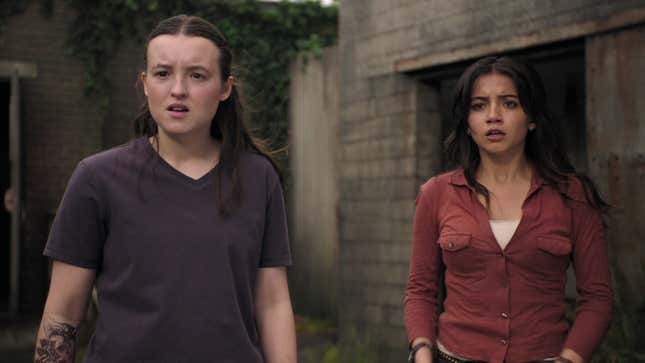
After all the heavy shit, Ellie asks how Dina knows for sure she’s pregnant, and she says that after barfing at the bloody Seraphite aftermath, her period being late, and peeing on four pregnancy tests, she’s pretty sure there’s a bun in the oven. Despite her doubts, Ellie seems pretty on board with a three-person co-parenting situation between the two of them and Jesse, which contrasts greatly with how this revelation nearly caused a rift between Dina and Ellie in the games. She even says, “I’m gonna be a dad,” which I’m sure will just thrill anyone who already viewed this storyline as an example of heteronormative nuclear family dynamics in the game. I don’t count myself among them, to be clear. The joys and stresses of having children shouldn’t be exclusive to breeders who make them, and queer parents have every right to child support checks, too.
The tender moment is interrupted by radio chatter and explosions. The wolves on the other side of the walkie-talkie mention that Nora (Tati Gabrielle) is at the Lakehill Hospital and will likely know where Abby is. The girls head to the roof to get a better lay of the land and figure out where to go, but Ellie asks Dina to consider staying behind because things are different now that there’s another life on the line. Dina hesitates, but agrees and holds Ellie’s hand as the two reaffirm that they’re in this together. They’ve come this far; time to get a taste of the revenge Ellie’s been craving. But will she bite off more than she can chew? Find out on the next episode of The Last of Us: U-Haul Lesbian Road Trip.
New episodes of The Last of Us premiere on Max on Sundays at 9 p.m. Eastern.